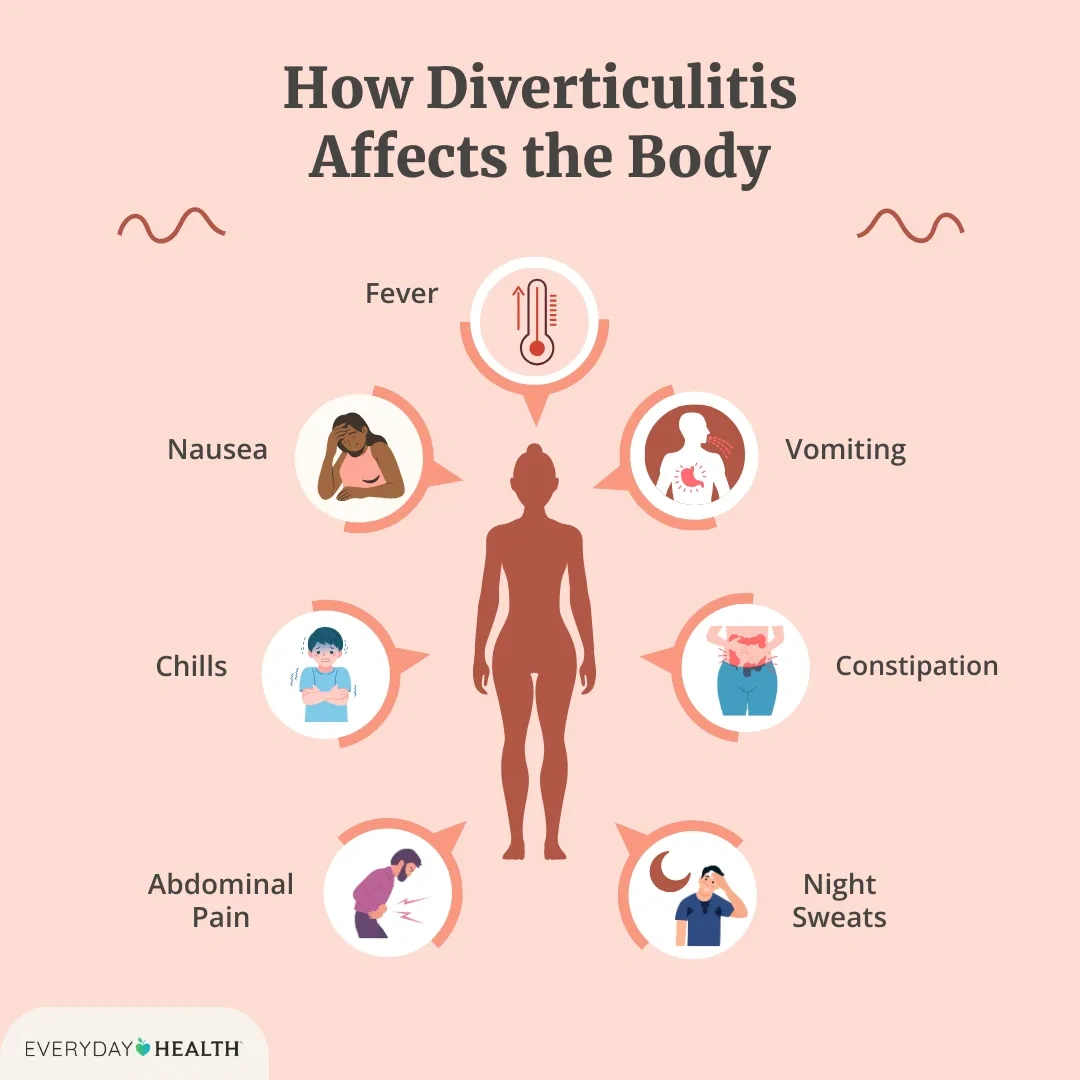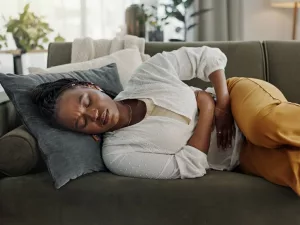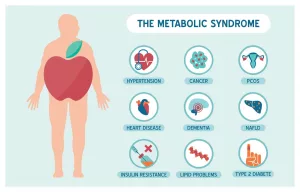
Wait, Why Am I Waking Up Drenched?
Let’s set a scene. You’re in bed, warm and cozy. Then, wham…you’re suddenly bathed in sweat. The sheets? Soaked. Pajamas? Gross. Your mind goes places — is it a bad dream? Ate something funky? Early menopause, maybe? For a lot of us, this is just a weird, gross blip. But sometimes, those midnight drenchings are your gut’s way of waving a little red flag…hey, something’s up!
So, if you’ve been wondering “can diverticulitis cause night sweatts?” or you’ve just noticed things feel off — let’s dig in together. I promise, we’ll make sense of what your gut (and your sweat glands) are saying, minus all the medical mumbo-jumbo.
What’s Really Happening Inside?
Why Would a Gut Problem Make You Sweat?
First, let’s talk about these weird little things called diverticula. Picture your colon as a garden hose left out in the sun too long—eventually, it gets those funky bulges and weak spots. That’s basically what happens in your gut. These bulgy pouches are called diverticula. They’re normal, super common as we get older, and honestly, they don’t usually cause drama.
But sometimes, these pouches get inflamed or infected — that’s diverticulitis. It can start out mild — a bit of tummy pain, maybe some bloating you chalk up to beans, or a change in what’s happening in the bathroom. But here’s the swerve: when your gut’s inflamed, it can trigger your immune system — which can mean chills, fever, and yep, those night sweats no one talks about can diverticulitis cause night sweattsor according to Houston Methodist’s specialists.
How the Sweaty Dominoes Fall
Here’s how it goes down: Your body senses the infection, so it cranks up the heat (that’s your fever). Night time hits, your body’s trying to regulate all that — cue the cold chills, and then the sweat. Sometimes it sneaks in quietly, sometimes it hits so hard you wake up needing a full-on change of clothes. Not fun.
Doctors will tell you night sweats aren’t the main symptom of diverticulitis — usually you hear about the cramping, the pain (usually low on the left side), the possibly what does poop look like with diverticulitis situation (which honestly, deserves a whole post). But if infection takes hold, sweats can absolutely join the party as described by Digestive Disease Care.
Quick check: not just menopause or bad dreams? Watch for these too:
- Left-side lower tummy pain
- Changes in your poop — sometimes runs, sometimes you feel “blocked”
- Bloating and gas that refuse to quit
- Mild to moderate fever (sometimes this sneaks by…)
- Occasional rectal bleeding (less common, but keep an eye out)
Sneaky Signs: It’s Not Always What You Expect
When Night Sweats Aren’t the Only Clue
Here’s where it gets a bit “wait, what?” You might not even feel classic feverish. Some folks just get the sweats, have vague tummy pain, or mixed-up bathroom trips — and that’s it. I heard from a friend, Lisa, who kept changing her sheets for weeks and assumed menopause. Turns out, after a particularly stubborn week of sweats and a quick Google spiral about “can diverticulitis cause night sweatts,” her doc found—yep—diverticulitis.
Her main clue was sweating through her pajamas nearly every night, with a little cramping on the side. That’s it. If you’re finding yourself in a similar boat, reluctant to mention it because it feels random or embarrassing — you’re definitely not alone. Honestly, lots of people downplay this because it sounds so…unusual!
Table: Common vs. Sneaky Symptoms of Diverticulitis
| Common Symptoms | Sneaky/Atypical Symptoms |
|---|---|
| – Lower left abdominal pain – Constipation/diarrhea – Nausea, vomiting – Bloating/gas | – Night sweats – Mild chills with no clear fever – Unexplained fatigue – Slight changes in what does poop look like with diverticulitis |
Your Body’s Not Being Random
Why Inflammation Messes With Temperatures
Inflammation is basically your body calling in heavy reinforcements. Release the chemical messengers! Apply heat! Flood the area! This is great for fighting infection but less awesome for your sleep (or your laundry situation). It’s the same mechanism that brings on fever and goosebumps — your body’s temperature control center can get a little wonky.
So if you find yourself battling sweats, stomach drama, and maybe wacky bathroom trips? Don’t just power through it. Your body’s waving you down, and sometimes a gastroenterologist is exactly who you want on your side (shout out to the real ones who don’t just say “hydrate and rest”).
Still Not Sure If It’s Your Gut?
You might ask, “Could night sweats really be connected to poop and gut stuff?” Yes — and it’s not just rare or weird. A recent chat in my group text about “what does poop look like with diverticulitis” (yes, we have no shame) turned up two friends with night sweats who’d both been hospitalized with diverticulitis in their 50s. Why didn’t their doctors warn about sweats sooner? Maybe because, like you, no one expects gut bacteria to make their pajamas wet at 2 AM.
What Options Actually Help?
Coping with the Gross Stuff (And Yes, You Can Cool Down!)
So…how do you reclaim sleep and dry sheets? There’s no magic button, but there are tweaks. First off, you’ll want to get that gut calm — and that often means antibiotics, a short-term low-fiber or liquid diet, and a ton of patience. (Hello, bland soup week.)
But waiting for the meds to kick in, you can actually do a lot:
- Use breathable sheets and jammies (cotton, linen — trust me, synthetics are evil when sweaty)
- Keep a backup set of clothes close by
- Lower the bedroom temp — fans, windows, the works
- Some folks swear by cold packs on their pillow
- Drink lots of water — dehydration just makes it worse
Most importantly: if your symptoms get worse (unbearable pain, throwing up, or actually seeing blood), call your doctor ASAP. Don’t do what my uncle Bob did and try to “tough it out”—he ended up in the ER. Not cute.
Long-Term — Can You Sweat Less?
Once you’re feeling steady? Time to think prevention. That’s high-fiber foods (fruits, veggies, whole grains) to keep things moving and help stop those pouches from flaring up again. The catch: increase fiber slowly…nobody needs more bloating right now.
Honestly, one of the most helpful things might be just keeping notes on your symptoms (yep, even sweaty nights) along with your what does poop look like with diverticulitis status. Tracking this stuff can help your doctor see patterns and helps you feel way more in control.
Diet Tweaks: What’s Worth Trying?
| Low-Fiber (during a flare) | High-Fiber (for prevention) |
|---|---|
| – White rice – White bread – Applesauce – Clear broths | – Oatmeal – Lentils – Fresh fruit (think peeled apples, berries) – Veggies (carrots, peas) |
When Should You Worry?
Night Sweats Won’t Kill You, But…
Look, most night sweats tied to diverticulitis are treatable. But—and this is big—sometimes, they’re a hint you’re developing a complication like an abscess or even a tear in the colon wall (as explained by Southside Surgical). If you add unrelenting pain, worsening sweats, or the chills won’t quit, don’t just reach for another towel. It’s time for the pros.
And if you’re still not sure, trust your gut. (Ha.) Night sweats might seem “small,” but if something feels off, check in with your GP or a digestive health specialist. Your future, less-sweaty self will thank you.
So…Can Diverticulitis Cause Night Sweatts? Yup. Here’s What To Do Next
Let’s bring it home: yes, diverticulitis can totally cause night sweats. Not everyone will get them, and they’re not always the star player—but mix a gut infection with your body’s wild response system, and sweat city is real. So, if you’ve been wondering about can diverticulitis cause night sweatts, the answer is a clear, mildly-annoyed “yes.”
The big takeaway? Night sweats aren’t always random, and you shouldn’t just chalk them up to spicy food (or “just getting older”). Track your symptoms. Notice your mood, your energy, and—yes—what does poop look like with diverticulitis looks like on your most dramatic days. Telling your doc the weird details could make all the difference for getting a solid diagnosis and a treatment plan that actually helps you sleep through the night.
If this sounds just a little too familiar, try some of the tips above—keep your space cool, stay hydrated, and give your body some love with easy foods. Most importantly, don’t play tough guy with your health. And if you end up changing your sheets a few nights in a row? You’re not failing at adulting, promise. Sometimes, your body is just doing its best to talk to you (loudly, and kinda grossly).
Here’s to feeling better, sleeping dry, and having way more chill nights. What’s your first step to tackling those sweats? Try one thing tonight—and let your gut (and your comforter) thank you in the morning.

























Leave a Reply
You must be logged in to post a comment.